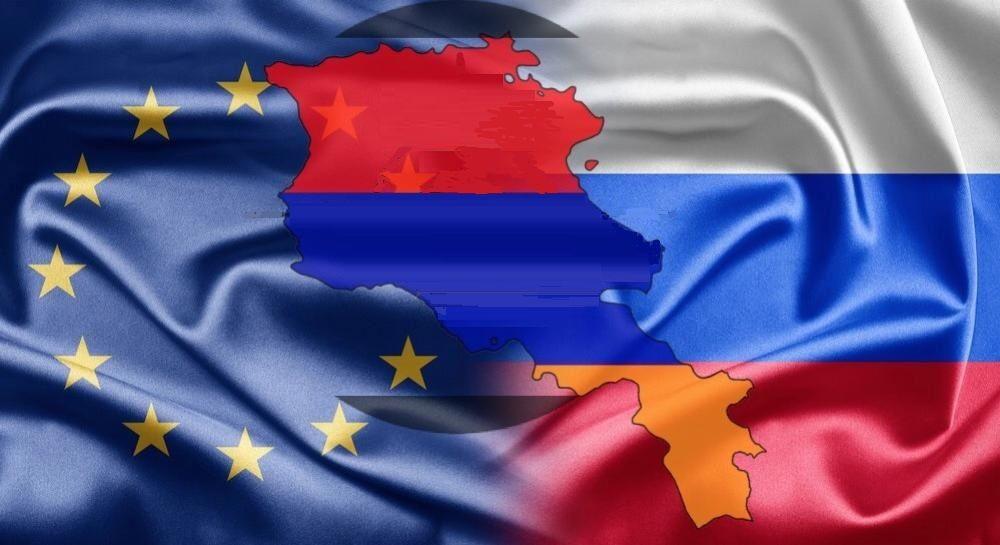
West's Blinding Of Yerevan Deepens Rifts With Moscow

Fatime Letifova Read more
As tensions between Armenia and Russia rise, new members are added to Yerevan's list of Western patrons. But to call it a true supporter or patron seems somewhat unrealistic. Armenia's behavior seems somewhat skeptical towards the Kremlin, as the issue is that Yerevan should be torn from the CSTO and completely riveted to the Western league.
For example, in today's hour-long briefing, Russian MFA spokeswoman Maria Zakharova made an interesting argument about Armenia's desire to leave the CSTO and the border issue, inspired by the West.
The Russian diplomat said that while the Armenian leadership took a harsh stance against Russia, in reality it did so unwillingly. In other words, Armenia actually believes that its borders are safer if they remain under the control of Russian troops.
However, this is not the case for Nikol Pashinyan, given the increasing influence of the West over Yerevan today.
Armenia's plan to leave the Collective Security Treaty Organisation (CSTO) and the Eurasian Economic Union and then to join the European Union prompts it to seek new allies.
It seems that since France, Armenia's biggest patron, is involved in fetching military assistant to Ukraine, Armenia decided to fill the gap turning to Britain. The British Deputy Defence Minister's declaration that they are ready to protect Yerevan from the Kremlin's "retaliatory response" was seen as a new shelter for this country.
However, we must not forget that the West's current aim is neither to protect Armenia from Russia nor to stand by Armenia even if official Paris' dream waging another war in the Caucasus comes true. It is clear that the war between Ukraine and Russia for a long time was actually between the West and Russia. The main purpose of British support for Yerevan is not to express an aggression towards Azerbaijan like France but obviously to weaken Russia.
Because there have been strong relations between Britain and Azerbaijan since very long time. There is no doubt that the British government would not want to lose a strategic partner like Azerbaijan.
For example, in 2003-2019, Great Britain invested about 20
billion dollars in the economy of Azerbaijan.
According to the information of the State Statistics Committee on
foreign investments in 2020, Great Britain ranked first among the
ten countries that invested the most in Azerbaijan. More than a
third of all foreign investments fell to Great Britain.
In 2021, the exports volume from Azerbaijan to Great Britain was 397 million dollars, and the imports was 271 million dollars.
In the same year, Great Britain was the 14th largest exporting country of Azerbaijan and the 9th largest importing one. The total volume of trade turnover between Azerbaijan and Britain was 667 million 870 thousand dollars, and Great Britain ranked 11th among the main trading partners of Azerbaijan.
Even after the 44-day Second Garabagh War, the British government supported Azerbaijan. Since 2020, Great Britain has provided approximately 1.5 million pounds sterling (1,920,022.5 dollars) to combat landmines in Azerbaijan, and in August last year, it allocated an additional 500,000 pounds (640,007.5 dollars).
The British government's support was not in only financial
field. Last year, the House of Lords of the Great Britain
Parliament discussed and showed a fair approach to thousands of
Azerbaijani refugees who lost their home and lands after the First
Garabagh war, lived in difficult conditions and wanted to return to
their homes.
So many examples like this are worth expressing Britain's special
support for Azerbaijan.
The fact that Armenia asked for help and then received a scrap of support is not due to the West's special interest in this country, but because it is a tool to create an obstacle for Russia in the region. But Armenia which is undoubtedly ruled by its Western partners, likes to hide the evidence and facts and exaggerate its tiny achievement.
Russia anticipates the upcoming danger from the Western coalition and says that unpleasant predictions for Yerevan are coming in the near future.
“However, continuing Yerevan's current course could ultimately cause irreparable damage to our allied relations, create serious risks for the sovereignty of the republic, completely destroy the existing effective mechanisms for ensuring the country's security, and affect the prospects for its progressive socio-economic development,” says Zakharova in her speech at the briefing.
This stubborn and narrow-minded political course of Yerevan is a threat not only to Russia, but also to the South Caucasus region. If Prime Minister Nikol Pashinyan does not make a reasonable decision soon, it is likely that this issue will deepen and become the main issue on the agenda for the regional states.
Legal Disclaimer:
MENAFN provides the
information “as is” without warranty of any kind. We do not accept
any responsibility or liability for the accuracy, content, images,
videos, licenses, completeness, legality, or reliability of the information
contained in this article. If you have any complaints or copyright
issues related to this article, kindly contact the provider above.

















Comments
No comment